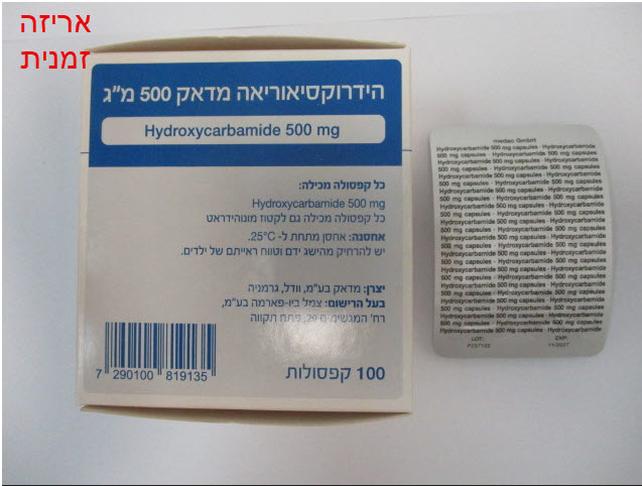Quest for the right Drug

הידרוקסיאוריאה מדאק 500 מ"ג HYDROXYUREA MEDAC 500 MG (HYDROXYCARBAMIDE)
תרופה במרשם
תרופה בסל
נרקוטיקה
ציטוטוקסיקה
צורת מתן:
פומי : PER OS
צורת מינון:
קפסולות : CAPSULES
עלון לרופא
מינוניםPosology התוויות
Indications תופעות לוואי
Adverse reactions התוויות נגד
Contraindications אינטראקציות
Interactions מינון יתר
Overdose הריון/הנקה
Pregnancy & Lactation אוכלוסיות מיוחדות
Special populations תכונות פרמקולוגיות
Pharmacological properties מידע רוקחי
Pharmaceutical particulars אזהרת שימוש
Special Warning עלון לרופא
Physicians Leaflet
Adverse reactions : תופעות לוואי
4.8 Undesirable effects Bone marrow depression is the dose limiting toxicity. Gastrointestinal side effects are common but rarely require dose reduction or cessation of treatment. The frequencies of adverse events are categorised using the following convention: Very common (≥ 1/10), common (≥ 1/100 to < 1/10), uncommon (≥ 1/1,000 to < 1/100), rare (≥ 1/10,000 to < 1/1,000), very rare (< 1/10,000), not known (cannot be estimated from the available data). Infections and Infestations Rare Gangrene Neoplasms Benign and Common Malignant(including cysts Skin Cancer (squamous cell cancer, basal cell carcinoma) and polyps) Blood and lymphatic system Very common disorders Bone marrow depression, CD4 lymphocytes decreased, leukocytopenia, anaemia,thrombocytopenia Common Megaloblastosis Not known Haemolytic anaemia Immune system disorders Rare Hypersensitivity reaction Metabolism and nutrition Very common disorders Anorexia Rare Tumour lysis syndrome Not known Hyperkalaemia Psychiatric disorders Common Hallucinations, disorientation Nervous system disorders Common Peripheral neuropathy1, somnolence, neurological disturbances including headache, dizziness and convulsion Respiratory, thoracic and Common mediastinal disorders Pulmonary fibrosis, pulmonary oedema, acute pulmonary reactions consisting of diffuse pulmonary infiltrates, fever and dyspnoea Not known Interstitial lung disease, pneumonitis, alveolitis, allergic alveolitis, cough Gastrointestinal disorders Very common Pancreatitis1, nausea, vomiting, diarrhoea, constipation, stomatitis, mucositis, stomach discomfort, dyspepsia, abdominal pain, melaena Hepatobiliary disorders Common Hepatotoxicity1, hepatic enzyme increased, cholestasis, hepatitis Uncommon Blood bilirubin increased Skin and subcutaneous tissue Very common disorders Skin ulcers (especially leg ulcers), cutaneous vasculitis, pruritus, violet papules, dermatomyositis-like skin changes, alopecia, maculopapular rash, skin exfoliation, skin atrophy, erythema (e.g. facial erythema, acral erythema), skin hyperpigmentation, nail disorder (e.g. nail pigmentation, nail atrophy) Uncommon Actinic keratosis Very rare Systemic and cutaneous lupus erythematosus Not known Dry skin Renal and urinary disorders Very common Dysuria, transient renal tubular dysfunction accompanied by increased blood uric acid, increased blood urea and increased blood creatinine Very rare Renal impairment Reproductive system and Very common breast disorders Azoospermia, oligospermia General disorders and Very common administration site Drug fever, asthenia, chills, malaise conditions 1 Fatal and non-fatal pancreatitis and hepatotoxicity and severe peripheral neuropathy have been reported in HIV-infected patients who received hydroxycarbamide in combination with antiretroviral agents, in particular didanosine plus stavudine. Neoplasms benign, malignant and unspecified (incl. cysts and polyps) In patients receiving long-term treatment with hydroxycarbamide for myeloproliferative disorders such as polycythaemia vera and thrombocythaemia, secondary leukaemia may develop. To what extent this relates to the underlying disease or to treatment with hydroxycarbamide is presently unknown. Blood and lymphatic system disorders During hydroxycarbamide therapy megaloblastosis may occur which does not respond to treatment with folic acid or B12. Bone-marrow suppression subsides, however, when therapy is discontinued. Hydroxycarbamide can reduce plasma iron clearance and iron utilisation by erythrocytes. However, it does not appear to alter the red blood cell survival time. Immune system disorders Hypersensitive reactions: High fever (>39°C) requiring hospitalisation in some cases has been reported concurrently with gastrointestinal, pulmonary, musculoskeletal, hepatobiliary, dermatological or cardiovascular manifestations. Onset typically occurred within 6 weeks of initiation and resolved promptly after discontinuation of hydroxycarbamide. Upon readministration fever re-occurred within 24 hours. Metabolism and nutrition disorders Cases of hyponatraemia have been observed during post-marketing surveillance. Gastrointestinal disorders Severe gastric distress (nausea, emesis, anorexia) resulting from combined hydroxycarbamide and irradiation therapy may usually be controlled by temporarily discontinuing hydroxycarbamide administration. Skin and subcutaneous tissue disorders Hydroxycarbamide may aggravate the inflammation of mucous membranes secondary to irradiation. It can cause a recall of erythema and hyperpigmentation in previously irradiated tissues. Erythema, atrophy of skin and nails, skin exfoliation, violet papules, alopecia, dermatomyositis-like skin changes, actinic keratosis, cutaneous ulcers (especially leg ulcers), cutaneous vasculitis, pruritus, hyperpigmentation of skin and nails, and dry skin have been observed partly after years of long-term daily maintenance therapy with hydroxycarbamide. Reporting of suspected adverse reactions Reporting suspected adverse reactions after authorisation of the medicinal product is important. It allows continued monitoring of the benefit/risk balance of the medicinal product. Any suspected adverse events should be reported to the Ministry of Health according to the National Regulation by using an online form: https://sideeffects.health.gov.il/ In addition, you may report by sending an e-mail message to: safety@tzamal-medical.co.il

שימוש לפי פנקס קופ''ח כללית 1994
Melanoma, resistant chronic myelocytic leukemia, metastatic or inoperable carcinoma of the ovary, with radiation therapy of squamous cell carcinoma of the head and neck
תאריך הכללה מקורי בסל
01/01/1995
הגבלות
תרופה שאושרה לשימוש כללי בקופ'ח
מידע נוסף
